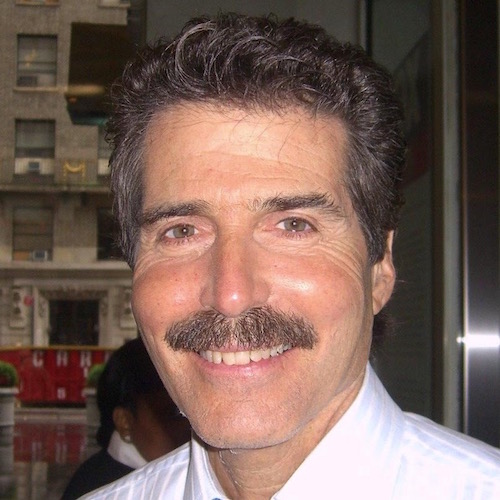 Evolution
Evolution
 Faith & Science
Faith & Science
 News Media
News Media
In Search of a New Metaphor: "Science Abuse," Maybe?

Writing at Townhall, the smart and independent-minded TV journalist John Stossel (pictured above) complains that the trite phrase “War on Science,” popularized by Chris Mooney, could as easily be applied to the political Left as to the Right. However, he says, the left-wing version has serious negative ramifications for daily life whereas the right-wing version is basically harmless.
This year is the 10th anniversary of a book [by Mooney] called “The Republican War on Science.” I could just as easily write a book called “The Democratic War on Science.”
The conflict conservatives have with science is mostly caused by religion. Some religious conservatives reject evolution, and some oppose stem cell research.
But neither belief has a big impact on our day-to-day lives. Species continue to evolve regardless of what conservatives believe, and if conservatives ban government funding of stem cell research, private investors will continue the work.
By contrast, the left’s bad ideas about science do more harm.
Many on the left — including a few of my fellow libertarians — are paranoid about genetically modified organisms. These are crops that have DNA altered to make them grow faster or be more pest-resistant. The left calls that “playing with nature” and worries that eating GMO food will cause infertility, premature aging and a host of other problems.
Of course the point about evolution is ill informed. It’s evident that Stossel doesn’t know what thoughtful people doubt about “evolution” or why they do. It would be helpful if he applied some of his trademark skepticism to the Darwin debate.
Beyond that, the War on Science metaphor is wrong. No one is waging a campaign against science per se. They are disputing majority scientific views on a variety of points, sometimes with good reason, sometimes not. It’s not a partisan thing — Right versus Left — either. Stossel is correct about that. Remember how among the most judicious responses to atheist philosopher Thomas Nagel’s book, Mind and Cosmos: Why the Materialist Neo-Darwinian Conception of Nature Is Almost Certainly False, came from the liberal (pre-evisceration) New Republic?
If it’s not a political thing, how about the “Religion v. Science” clich�? Obviously not. You’d have to say what you mean by “religion” and what “science” you are talking about — all claims with a scientific veneer, endorsed by a crowd associated by the mainstream media with “science”? That is just hopeless.
I submit that we’re in need of a new metaphor for what Stossel is trying to put his finger on. Scientism? That’s part of it, but most people don’t know what “scientism” means, and it doesn’t encompass some of the misapplied skepticism associated with what he calls (inaccurately, as noted above) the “Democratic War on Science.”
Perhaps the right way of expressing it is “Science Abuse.” Many good things can be misused with harmful results — not just the familiar “substances” but trust, a good name, private information about others, natural resources, and much, much more. In any such case, someone tries to use a shortcut to obtain ends that may even be fine in themselves, if he had gone about seeking them the right way. It’s the shortcut that’s the problem.
For example, I would say religious commitment is a noble thing, if the religion is noble, but I’ve seen people ignore difficulties in the available data in a shortcut to persuade others, or themselves, of the rightness of their beliefs. We can be too willing to put aside skepticism in a good cause, or a cause that it pleases us to think is good, pretending to ourselves that we’ve got everything all figured out.
With abuse in the context of ideas, there’s always an agenda, an axe to grind, even if unacknowledged, even privately, even to himself, by the abuser.
So it is with science. John Stossel’s thoughtless throwaway reference to “evolution” is the end result of the way that the prestige and good name of science have been abused to persuade otherwise thoughtful people that evolutionary biology has got everything all figured out, in particular that the blind Darwinian mechanism long ago explained how complex biological structures arise. Seemingly, John Stossel is a victim, not unwilling, of that science abuse.
Someone as smart as he is ought to be able to distinguish the several meanings of “evolution” — see our newly updated Educator’s Briefing Packet for more on that — and weigh for himself the varying credibility of each claim. And yes, what we believe about the origins of life and the cosmos has a profound real world impact. That’s why atheists like biologist Jerry Coyne are so eager to persuade others that the universe is without an author, an idea that has not just religious but cultural and political ramifications pleasing to Professor Coyne.
Darwinian advocates abuse the ambiguity of the world “evolution” as a shortcut to their own ends. They abuse the public’s limited knowledge and patience for science, and the desire to be on the prestigious side of a weighty scientific argument, to persuade people like John Stossel to lay aside their customary skepticism, to blithely buy the line that skepticism about Darwinian theory is all a function of “religion,” that there is “no debate,” no legitimate, substantive debate, about cosmic and biological origins.
That is science abuse. And it works. The evidence is right there in Stossel’s article.
Image: John Stossel, by Nightscream (Own work) [CC BY 3.0], via Wikimedia Commons.
